SPECTRUMPlus+

Reporting on the highlight events of CFI's summer
The 48th European ECFS 2025 4th - 7th June 2025
The 13th Annual Head2Head Walk 7th September 2025

Featuring
- Looking forward to the Head2Head Walk 2025
- ECFS Report 2025
• Aging and CF
• Mental Wellbeing and CF
• Medical Trauma Stress and CF
• Disordered eating, body image and impact of weight gain
• CF modulator treatments - Developments and clinical observations
• Sleep and CF in the era of modulatorss
• Medical Trauma Stress and CF
• A changing landscape in nutrition and diet for pwCF and their CF teams
• Influencing Bone Health in CF
• 'How Are We Measuring Mental Health and Quality of Life Impacts of CFTR Modulators?

Looking Forward to the Head2Head Walk '25
On the 7th of September, hundreds of supporters, fundraisers and walkers will embark on a truly memorable journey from Howth Head to Bray Head to raise funds and awareness of people with Cystic Fibrosis in Ireland.
The Head2Head Walk is one of the most popular events in our calendar of events every year. This iconic walk from Howth Head to Bray Head takes you along a stunning coastal walk, through the city centre and stopping at Sandymount strand for a well deserved rest and lunch. Some walkers choose to finish their walk at Sandymount after the first 19km and receive their finishers medal here. Others opt to begin at this point, walking the next 18km to Bray, while others begin at Howth and walk the full 37km finishing at the sea front in Bray. If you would like to join the Head2Head Walk this year, visit www.cfireland.ie to sign up and be a part of somethiing wonderful. The early bird discount ends in July so don't miss out on this amazing event! Here is what previous years paticipants have to say about the event:

I have friends who have children with CF. For a few hours we go through a bit of tough walk, it's nothing compared to what people with CF go through day in, day out. If we raise money and awareness of their struggles it's all worth it. It's also a beautiful walk and so amazing how many people from all walks of life come together for the people we love.

The support team was absolutely fantastic they were top notch and went such lengths to make it a great event - well done to all

Volunteers were so friendly, chatting to friends along the way, raising money for a great cause

CFI Fact!
Did you know that the funds raised by our supporters have enabled the CFI Member Services team respond to 768 calls and 1582 emails between June 2024 and July 2025?
Thank you for making this possible!

This was a brilliant day and made so memorable. I really felt that the Head2Head team did everything they could have done to ensure the walkers were looked after. Everyone was in good humour and as a participant, I was made feel valued and appreciated for being part
European Cystic Fibrosis Society Conference 2025 Milan
CFIhad all ears to the ground at this year’s ECFS conference in Milan. Delegates and co-authors of this report Cian Greaney, Rory Tallon and Nicola Delaney Foxe attended lectures, workshops and symposia as they learnt of upcoming and emerging developments in CF research and listened to the many conversations taking place in the CF sphere.

Cian Greaney BSc PhD candidate School of Allied Health University of Limerick
Cian Greaney BSc is a PhD candidate at the School of Allied Health, University of Limerick. Cian’s doctoral research explores the dietary intakes and quality of adults living with cystic fibrosis (CF), including the interrelationships between diet quality and patient-reported outcomes. His work also investigates the lived experiences, drivers ofdietarybehaviour,andbarrierstodietary changeinthispopulation.

Rory Tallon CF Advocate
Cystic Fibrosis Ireland
Rory works as CF Advocate as part of CFI’s member service team to help and support people with CF and families affected by CF through information, guidance, grants and advocacy. Rory joined CFI in 2016 having previously worked as a clinical data manager in a pharmaceutical research organisation for 20 years. Rory qualified with a BSc (Hons) in Industrial Microbiology with Chemistry from University College Dublin and an MSc in Biological Sciences fromDublinCityUniversity.

Nicola Delaney Foxe
Strategic Communications Senior Coordinator
Cystic Fibrosis Ireland
Nicola joined CFI as Public Awareness and SocialMediaOfficerinJanuary2022,moving totheroleofCommunicationsandAwareness Raising Senior Coordinator in September 2023 and Strategic Communications Senior Coordinator in February 2025. Nicola was self-employed from 2012 until 2020 and partnered with charitable, not-for-profit, public and private sector organisations. Nicola changed careers in 2021, graduating from DCU’s Masters in Public Relations and StrategicCommunications(Hons).
ECFS 2025: The Future of CF
Stepping into the future of living with CF, treating CF, and notably aging with CF was a core focus at ECFS 2025 this year, which was held in Milan. Delegates from around the world gathered to learn, share, and discuss many areas of significance to the global community.
Dr. Carlo Castellani, Director of Genoa Cystic Fibrosis Centre and Director of the Italian CF Research Foundation, opened the conference, identifying three areas of focus for the future management of CF. Dr. Castellani firstly spoke of the management of those with CF eligible for and taking CFTR modulator treatments. Secondly, he mentioned the classical treatment for those with CF ineligible for CFTR modulator treatments, and finally, he spoke of the path ahead for those in low-income countries with little or no access to routine CF care, such as antibiotics and pancreatic enzymes. Bringing his address to a close, Dr. Castellani was proud to introduce a spectacular live performance by a celebrated local La Scala opera singer.
Dr Pierre-Régis Burgel from France delivered the ECFS Award lecture on CFTR modulators in people with CF with rare CF-causing variants. His groundbreaking research in the France on the use of modulators in those with rare CF-causing variants influenced the welcome licencing decision announced by the EMA in April of this year to expand the approved use of Kaftrio (Elexacaftor/Tezecaftor/Ivacaftorhttps://www.cfireland.ie/about-cf/latest-news/regulatory-approval-granted-for-a-label-expansion-of-kaftrio-to-those-with-raregene-variants
Aging and CF
With the advent of better treatments, physiotherapy, cross infection guidelines and of course the introduction of highly effective modulator therapies, pwCF have experienced dramatic strides in quality of life and many pwCF are now looking at futures that mere decades ago seemed so far out of reach. PwCF are now approaching life stages like further education, entering the workforce, and balancing their family and personal lives with the management of their CF. During the conference, there was a focus on Aging well with CF and becoming comfortable having the important and honest conversations about the physical and emotional challenges of life as a pwCF navigating the present and future decades.
Aging and CF: Establishing and maintaining good habits
Catherine McDonald from the US highlighted the importance of nutrition in the first 1000 days of life as she emphasised the link to long-term positive health.. McDonald presented the point that while modulator therapy has had incredible benefits, it does not mitigate malnutrition, so screening is important for identifying malnutrition early on. Also advocating for establishing good habits, Donald Urquhart from Scotland, stressed the importance of continued exercise in a bid for healthy aging. His mantra ‘the fitter you are, the longer you live’ illustrates how exercise and physio interventions are even more important in an aging population.
These good habits become relevant again when considering the increased cancer risk in people with CF. Daina Kalnins from Canada presented on whether there is a specific recommended diet when considering the risk of cancer in the CF population. Kalnins explained that although it is the CFTR not working that makes the cells more susceptible to becoming cancerous, the dietary recommendations for the general population appear to be the best supportive evidence for people with CF.
Aging and CF: Having those conversations.
People with CF are planning for futures as never before, CF Nurse Majda Ostir from Slovenia reports how her patients are coming to the clinic ready with questions about aging and comorbidities. Ostir suggests that a two-way conversation about aging and the implications to a person with CF should begin in childhood, in an age-appropriate way and should evolve to remain relevant to the age and stage of the person. This also provides an opportunity to reinforce the importance of BMI, health, exercise, nutrition, and lung function.
Traci Kazmerski from the US, discussed the need for broadening the conversation to appropriately address LGBTQIA+ health concerns in CF.
A 6-question knowledge assessment attempted to answer questions such as how healthcare experiences differ for pwCF from the LGBTQIA+ community to the CF community, and what is the impact of gender-affirming hormone therapy on people with CF. The study found that care providers need support to fully understand and be comfortable with LGBTQIA+ health concerns in CF.
Hormonal fluctuations were top of the agenda, as was, the willingness of clinicians to delve into conversation with patients about perimenopause and menopause. While this is a little-studied area in cystic fibrosis, Jennifer Taylor-Cousar from the US reported on a small study conducted in her clinic, which analysed data from 39 respondents out of 460, who took a survey about female health and who were in the peri/menopause age range.
The study showed that 97% of the women had menopausal symptoms across one week and that CF symptoms and menopause symptoms overlap. Taylor-Cousar was unable to state whether or not the commencement of modulator therapy affects the timing of menopause in a pwCF, or whether symptoms such as anxiety or depression could be linked to one or the other, but concluded that teams need to get into a ‘menopausal mindset’ in their approach to CF care. She encouraged clinicians to get comfortable discussing menopause, use a menopausal rating scale, and give women with CF a safe space to have that conversation, or find a menopause practitioner to discuss their concerns with, wherever they are in the world.
Mental wellbeing and CF
The mental well-being of people in any community may be challenged several times throughout life. Life as a person with CF can at times be challenging. New diagnoses, first hospital stays, declining health and the unpredictable nature of CF are just some of the issues that may impact the mental well-being of pwCF and their families. Whether a person with CF, a medical professional in a CF Clinic, or parents of children with CF, the conference provided a good overview of the studies in this arena with a common recommendation to investigate CF considerations as well as taking a holistic and developmental view of a person’s care.
Pavla Hodkova from the Czech Republic discussed the sensitive issue of attachment in the early weeks of parenthood. Hodkova spoke of attachment theory, its importance and detailed how a child needs to feel as if the world revolves around them in those early days. They need to be held (symbolically) and nurtured as they navigate this new world they have entered. Hodkova spoke of the challenges to parents which can exist and referred to the TIDES study which found that postpartum depression and anxiety are elevated in parents of children with CF. She recommended that CF Care teams have a role in providing parents with a safe space, considering both their situation and their family situation, and support them as they too navigate a new journey.
Helen Love from the UK, delved into the stress that can be caused for both families and care teams when values, which are influenced by many factors, conflict with care requirements. The impacts of such conflict can affect both the person with CF and their CF care team and according to Love, resolution can be found by teams working to understand the values of the pwCF and the underlying reasons for them, and people with CF understanding the intervention required.
Medical Traumatic Stress (MTS) In CF
Similarly, Addison Cunio from the US discussed the stress trauma that medical procedures can induce. Medical Traumatic Stress (MTS) can have emotional and psychosocial impacts on family and caregivers and can affect the person’s health, behaviour, and adherence. Of note also, was that what may prove traumatic for one pwCF may not be perceived as traumatic to another pwCF. A particularly interesting cause of MTS Cuneo shares is the identity shift a pwCF may experience from being well to being sick, or conversely when a pwCF sees a shift in identity from sick to well, like in the instance of a successful transplant or an improvement in health due to the benefits of modulator therapy. Medical teams can also experience trauma as a result of being the ones to cause the stress.’ Consequently, Cunio recommended a trauma, team-based care system in CF Care first looking at universal approaches, then targeted approaches and finally treatment approaches to the trauma.
Disordered Eating, body image and impact of weight gain in CF
Edwina Landau (Israel) focused on the emerging issue of disordered eating, tying nutrition, physical wellbeing and mental wellbeing together. However, Landau argued that it is not an emerging issue; it is already an issue that is, like many aspects of CF Care, changing shape and form. Landau suggested that it is difficult to determine disordered eating in CF as it can occur across a lifespan and that, again as per many of the recommendations at this year’s ECFS, a standardised screening tool specific to CF, needs to be implemented.
In the CFTR modulator era, 28.7% of adults with CF are now classified as overweight, and 11.7% obese. Importantly, 40% report experiencing weight-related distress. These weight changes, combined with improved health, may lead to identity shifts and a sense of disconnection from the traditional CF community. HCPs need to be trained to recognise disordered eating for early intervention.
Dr Alexandra L. Quittner from the United States also noted changing adherence patterns to modulators and the impact of weight gain on the body image of pwCF. While overall adherence to ETI therapy remains high (90% at 12 months and 86% at 24 months), traditional CF treatments are increasingly being dropped. Dr Quittner expressed concern at reports of some individuals skipping modulator doses due to concerns about weight gain and altered body image.
Findings from the YETI Study (Body Image) showed that 78% of participants had low concerns overall, but women reported more concerns and side effects than men.
A key discussion point in the CF Landscape is mental wellbeing and modulatory therapy. Anna M Georgiopoulos (USA) and Isabelle SermetGaudelus (France) discussed the pharmacology and psychological side effects of modulator therapy. A key recommendation from this discussion was the updating of guidelines on psychological assessments for side effects that may happen on initiation of modulator therapy and within 3 months of starting. It is also key to take a holistic view of the symptoms being experienced and determine if there is a developmental or situational context to consider.
Conversely, there is also the consideration of those who cannot access or benefit from CFTR therapy. Sue Braun (Belgium) discussed that there can be difficulties in coping when pwCF find themselves in this situation. The benefits of modulators are visible and widely publicised, and this exacerbates the feeling of grief and living loss that may be experienced. Braun shared that there is a need to support and provide solutions for a person to move beyond living loss, as this feeling will not dissipate with time and needs intervention. The person needs to be reminded that they are not just a patient and that where there is grief, there always is hope. Coming back to the holistic view of life stages, Braun suggests also considering where the person is in their life and what stage, or milestone they are facing. This may help offer a future and help the person embrace the reality while fostering hope that something new and valuable may appear for them.
CFTR Modulator Treatments- developments and clinical observations
As always, there was a strong presence of clinicians and researchers from around Ireland, whose work and dedication we are immensely proud of.
Prof. Paul McNally of RSCI and CHI Dublin presented on the benefit of CFTR modulator treatment, linking early commencement with the lowering of sweat chloride levels which is associated with better lung function and reduced exacerbation rates. Normalising sweat chloride level from early in life may lead to prevention of irreversible disease, but continued study is required to investigate and evaluate this. Maintaining adherence to all CF treatments while on modulator therapy also remains a key area for future research.
Sleep and CF in the era of modulators
Anna M. Georgiopoulos from Boston, Isabelle Sermet-Gaudelus from France chaired a workshop of clinical experts to discuss the pharmacology and psychological sides effects of modulator therapy. We learned that it is important to understand that CFTR protein is expressed throughout the body- from the brain to the toes in multiple organs, including the eyes. The body adapts to a balance and for people with CF who have lived without CFTR modulator therapy the body has developed adapting to little or no CFTR protein function.
Taking CFTR modulator treatment then corrects to some extent CFTR protein function which is beneficial to pwCF, but the body must adjust to a new balance of CFTR protein function throughout. This adjustment phase can take a few months, and it is during this rebalancing phase that side effects may be most acutely felt. One such observed CFTR re-balancing side effect is sleep related disturbances that may be observed in the initial 3 months of commencing ETI CFTR modulator treatment. PwCF pre-modulator therapy may have altered sleep patterns that is normal for their body. CFTR protein may impact regulation of circadian rhythms and so CFTR modulator treatment may restore more typically normal sleep patterns such that PwCF may find their sleep pattern changes when commencing ETI CFTR modulator treatment while their body rebalances. Sleep related side effects tend to resolve for most PwCF after approximately 3 months on ETI CFTR modulator treatment. Sleep related disturbance on ETI modulator treatment remains an area for continued research.
A changing landscape in nutrition and diet for pwCF and their CF teams
In her presentation, ‘What Should We Advise People with Cystic Fibrosis to Eat?’ Professor Audrey Tierney (Limerick, Ireland) highlighted the shift needed in CF nutrition, from a focus on high-calorie, high-fat intake to one prioritising diet quality, balance, and long-term health. While traditional guidance aimed to prevent malnutrition and support lung function through BMI targets, the success of modulator therapies has improved growth and clinical outcomes, making undernutrition less common as the CF population ages.
Recent studies document a shift in BMI distributions. The increase in overweight people living with CF ranges from 7% to 18% over three decades. Traditional CF dietary advice prioritised calorie intake at any cost, often resulting in high-fat, low-nutrient patterns. As life expectancy rises, associated risks such as cardiovascular disease, metabolic syndrome, and cancer are emerging as new challenges.
A systematic review by Greaney et al. (n = 724 across 19 cohorts) found energy intake typically exceeded recommendations (110–200% Europe/Australasia; 125% USA). However, diet quality was poor, high in saturated fats (30–39.4% of energy), added sugars and trans fats, with low fibre and inconsistent fruit and vegetable intake. Micronutrient supplementation helped, but validated diet quality tools (e.g., HEIFA-2013, HEI-2015) were underused. Current recommendations may no longer suit this evolving population.
In an Irish study (n = 73), adult CF diets were assessed against both CF-specific and general guidelines using validated indices. Results revealed a continued reliance on the “legacy diet”, high-calorie but nutrient-poor. This suggests that while undernutrition is less prevalent, many people living with CF fall short of quality-based dietary targets, potentially impacting long-term metabolic health. Tierney’s group explored links between dietary patterns and quality of life. Digestive symptoms and FEV1% emerged as positive predictors of diet quality, highlighting the role of patient-reported outcomes in guiding nutritional care.
The dietitian’s role now extends beyond malnutrition management to include bone and liver health; CF-related diabetes; weight management; optimisation of vitamin status; gut health and symptom management. A survey of 12 Irish CF dietitians identified five key practice areas, with growing emphasis on behaviour change strategies (e.g., intuitive eating, motivational interviewing), use of food tracking apps (e.g., MyFitnessPal), and body image sensitive approaches. Modulator therapy has increased appetite and weight gain, raising new clinical and psychological concerns.
Qualitative data from three focus groups and 20 interviews (n = 29) revealed enhanced appetite and weight management challenges; knowledge disparities around diet; complex emotional responses to changing body image; and a strong demand for tailored and trustworthy advice. Professor Tierney concluded that CF nutrition care must evolve to meet the needs of a changing population. As malnutrition declines, overnutrition and its consequences are on the rise. Nutritional guidance should now focus on balance, diet quality, and psychological wellbeing, moving beyond calorie targets to person-centred, lifespan-focused care.
Much of the research presented above has been funded and supported by Cystic Fibrosis Ireland, Health Research Board, and a Research Ireland Postgraduate Scholarship.
Influencing Bone Health in CF
Dr. Moshe Heching, (Petach Tikva, Israel) examined the roles of nutrients beyond vitamin D in supporting bone health in CF. He noted an inverse relationship between bone health and vitamin D levels in some cases. Nutrients such as magnesium, sodium, and protein were identified as key factors, with 60% of magnesium being stored in bones. However, the link between magnesium and bone mineral density (BMD) remains inconclusive. In individuals who are pancreatic sufficient, there was an upward trend in BMD in relation to magnesium intake. Protein was shown to increase calcium absorption and stimulate insulin-like growth factor 1 (IGF-1), yet no correlation was found between protein intake and BMD among people living with CF on modulators. Notably, severe bone disease is often present in those with mild lung disease and vice versa, highlighting the need for dietary focus on high protein intake.
A variety of symposia offered interesting insights on the pancreas, Dr Andrea Parniczky (Hungary) spoke of ‘The new face of pancreas Prediction, Risk Factors and Prevention of Pancreatic Disease’’ Dr. Parniczky discussed how early use of CFTR modulators may preserve pancreatic function. Alcohol remains the most studied risk factor for pancreatitis, with 60% of the CF population reporting alcohol consumption. Alcohol disrupts CFTR expression and function. Additionally, 8–20% of people living with CF smoke, with smoking-related oxidative stress shown to inhibit CFTR, referencing studies by Verma in 1987 and 2001. Acute pancreatitis can lead to endocrine dysfunction and increases the risk of diabetes and mortality.
‘How Are We Measuring Mental Health and Quality of Life Impacts of CFTR Modulators?
Edwina Landau (Israel), Anna M. Georgiopoulos (USA), Helen Love (UK), and Marieke Verkleij (Netherlands) chaired this session which addressed novel mental health and quality of life issues emerging in the modulator era. Topics included life changes such as marriage, pregnancy, and body composition changes (e.g., weight gain and obesity), as well as financial stress, treatment adherence, employment gaps, and psychological impacts on those ineligible for modulators. Although longitudinal studies indicate stable to improved mental health in most individuals, certain subgroups report worsening mental health, including symptoms such as fatigue, brain fog, memory issues, irritability, and sadness, particularly in children aged 2–5. As mentioned above, monitoring was identified as important. Recommendations included biweekly assessments from two weeks prior to ETI initiation to six months post-initiation, and quarterly from six to twelve months.
The Tomorrow Lounge Session, ‘I’ve Got a Gut Feeling This Is Going to Be Important: The Brain-Gut Axis in CF Care’, was chaired by Rachel Massey-Chase (London, UK) and Kerry-Lee Watson. This session explored the interconnectivity of the nervous system and gastrointestinal tract. It addressed how gut dysbiosis, high-fat diets, slow gastric emptying, and increased vigilance to GI symptoms can intensify anxiety. The speakers highlighted how symptom such as bloating often dominate thoughts and may be worsened by psychological factors like catastrophising. A case study demonstrated the positive effects of a Mediterranean-style intervention, including a high-fibre diet, exercise, prebiotics/probiotics, meditation, hydration, PERT optimisation, and reduced reliance on PPIs. A six-session programme addressed traumarelated symptoms and included mindfulness, cognitive reframing, and self-management techniques, using tools like traffic light symptom tracking. Contact time and treatment burden were reduced through cognitive behavioural therapy (CBT), supporting its use in managing complex GI-psychological interactions.
A variety of vibrant and interesting posters were on display at the conference and they signposted new and exciting developments for the future. From the ‘CF Tummy Tracker’ mobile application which is under development to monitor daily gastrointestinal (GI) symptoms in individuals with CF aged 12 years and older to an overview of Circadian Rhythm Disorders in Children with Cystic Fibrosis in the Era of CFTR Modulators there was lots to learn and look forward to.
Poster Presentations
The team caught up with just some of the dedicated Irish researchers during the poster presentation section of the conference.
Paul O'Regan Researcher
The Cystic Fibrosis Registry of Ireland
Title: 'Body Image in the Era of Modulator
Therapies'
Paul O'Regan's poster explored the difference in improvement of Irish adults with CF on ETI in three groups:
• those who were naive to modulators
• those who switched from another HEMT (Ivacaftor) and
• those who switched from another CFTRm (Lum/Iva or Tez/Iva)
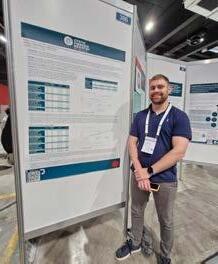
It was discovered that those who were naive pre-ETI had ppFEV1 which was decreasing annually, while both other groups had a stable ppFEV, after starting ETI. All three groups saw an improvement in ppFEV with those who were naive having the largest increase. The annual change after ETI was positive for all three groups but only statistically significant for the naive group and those who switched from another CFTRm. In conclusion, the study found that Irish adults who were naive to modulators prior to ETI saw the largest increase in both ppFEV1 and BMI after initiation. Those on Ivacaftor prior to switching had a smaller increase in BMI and ppFEV1 compared to the other two groups, but did experience clinically significant improvement in lung function and maintained stable in the following years.

Dr. Caroline Heary, Associate Professor, School of Psychology, University of Galway.
Funder: HRCI/HRB Joint Funding Scheme, co-funded with Cystic Fibrosis Ireland
Title: 'Exploring the Barriers and Enables of Optimal Healthcare Transition from the Perspectives of Young People and Parents'
This research explores the needs and experiences of young people living with Cystic Fibrosis and their parents as they prepare to transition to adult services or adapt to adult services. Key findings related to the timing or age of transition, the need to provide parents with clarity on their roles in adult services and preparing young people for the changed approach in adult services.
Cian Greaney PHd Researcher
University of Limerick funded by Research Ireland
Title:
'Body Image in the Era of Modulator Therapies'
Cian Greaney's poster entitled 'Body Image in the Era of Modulator Therapies' presents a sytematic review exploring how body image concerns in young people and adults with Cystic Fibrosis have evolved aross different treatment eras, paarticularly before and after the introduction of CFTR modulator therapies. The study synthesises both quantitative and qualitative studies, reveaing that while modulators have significantly improved physical health outcomes, body image issues still persist and they're evolving. Currently available body image evaluation tools may not be appropriate in the modulator era with questions tailored to a traditionally underweight population. The review highlights the need for integrated psychological and nutritional support in CF care, ensuring the improvements in physicl health don't come at the expense of mental wellbeing.
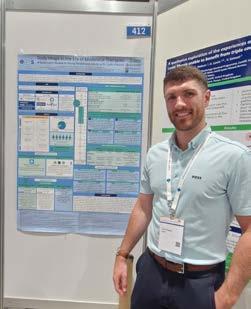
Daniel Goldstone Senior Clinical Psychologist
National Referral Centre for Adult Cystic Fibrosis
Affiliation: St Vincent’s University Hospital
Title: 'Rates of depression and anxiety among people with Cystic Fibrosis in Ireland, assessed with the PHQ-9 and GAD-7'
This study assessed history and symptoms of depression and anxiety in adults with CF in Ireland. Self-reported histories of lifetime depression (29%) and anxiety (22%) were similar to people with CF in the UK and Europe. Current rates of symptoms of depression (reported by 11% of participants) were similar to people with CF in the UK and Europe, while current rates of symptoms of anxiety (reported by 13% of participants) were lower than in people with CF in the UK and Europe.

CFRI Update

2024 data entry is complete! The CFRI team have been busy over the last few months finalising data entry to the registry for 2024 – this involves making sure all our data is up-to-date, accurate, and complete. Once all checks are done, we summarise the data and share data (which is pseudo-anonymised) securely with the European Cystic Fibrosis Registry (ECFSPR). The ECFSPR is a powerful resource which is contributing to research, policy and practice at an international level. We will now start preparing the 2024 annual report & infographic for the Irish registry so look out for that soon!
Future of Registries Taskforce (FoRT) report published – the Cystic Fibrosis Registry team, along with colleagues in dermatology registries, have been coordinating a multistakeholder group aiming to make sure the future of registries is secure in Ireland. The Cystic Fibrosis Registry is commonly used as an example of best practice in the impact that can be achieved with a patient registry!
The group published an important report (you can also read the summary here). Robyn from the registry presented the report at the recent Irish Health Research Forum – the event was all about the importance of registries. We continue to work on this project to make sure registries in Ireland are securely funded in the long-term!
ECFS in Milan 2025
As always, the team had a fantastic time attending the European Cystic Fibrosis Conference in Milan. It was great to catch-up with colleagues and learn about the latest in CF research and practice. The CFRI team presented 4 posters (we think our biggest number yet) – our posters focused on a variety of topics using different registry datasets and experiences. CFRI data and work was also used in multiple other posters and presentations. The following CFRI posters were on show:
- Data quality at the registry
- Outcomes for PwCF switching from a CFTRm to ETI compared with those starting ETI having not taken CFTRm before
- Physiotherapy data collection in the registry
- Lessons from CFRI for safeguarding the future of patient registries
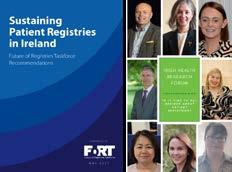
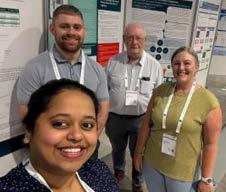
The team attended lots of presentations across the 3 days. Some of the big topics which appeared were:
- Pregnancy, maternal and neonatal outcomes in PwCF
- The use of digital health in CF care including telehealth, AI, and home monitoring – we also participated a working group on telehealth in CF led by Tamara from CUH) where Godfrey gave a work-package update.
- Innovation in managing advanced lung disease
- Ensuring data collected at the level of national registries can be brought together in a consistent way with other national registries to create global insights to inform policy and better decision-making
- There was a focus on the inequalities in CF care globally as well as means to expand access to new care and therapies. We heard talks on the compassionate use programmes in France and CF care in low and middle-income countries
- The use of Patient-Reported Outcome Measures in CF care and in registries
Aside from the presentations, the team attended a number of important meetings. Laura, CFRI Head of Research, sits on the ECFSPR Executive Committee; she attended meetings for the Executive Committee, the Global Registries Group, and meetings related to data definitions. The team also attended the ECFSPR Steering Group meeting. Overall, a varied programme, plenty of meetings and lots of networking made for a great conference!

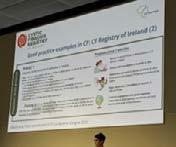

Want to learn more about what CFRI
do?
If you would have any questions or would like information about participating in the registry, please contact your CF Centre or the CF Registry at info@cfri.ie. Participation is entirely voluntary. You are free to revoke your consent and withdraw from the registry at any time. We would love if you could follow us on social media or via our website. We post updates on our work and on the exciting projects we are working on. Scan the QR code to learn more & access the latest data & reports!

CFI Fact!
Did you know the CFRI was founded right here in CF House, 20 years ago?
Patient registries are more than just electronic databases; they are tools to transform real-world clinical, social, and patient-reported data into actionable insights. Through analysing registry data, registries identify patterns in clinical, epidemiological, and social data over time, guiding healthcare providers and policy makers in making informed decisions.

